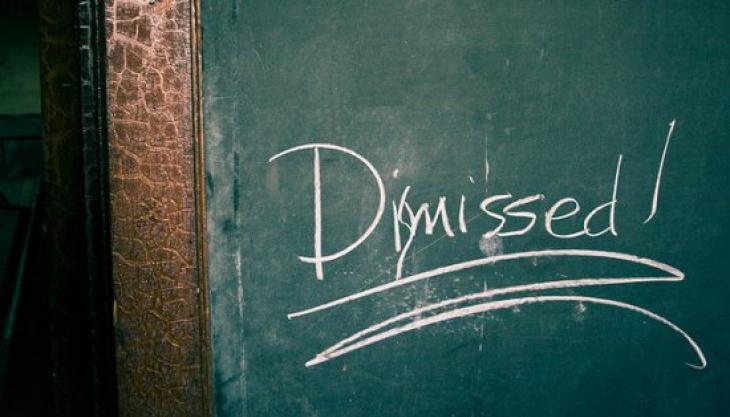Could Your Bankruptcy Case Be Dismissed? Yes and Here's Why!
Submitted by Rachel R on Wed, 06/17/2015 - 1:32pm

Bankruptcy case dismissals can be voluntary or involuntary
Image Source: Flickr User Orin Zebest
Both Chapter 7 and Chapter 13 can be perfect paths to meaningful debt relief. Chapter 7 allows you to discharge most unsecured debts including medical bills and credit cards. Chapter 13 allows you extra time to catch up on past due secured debt like your mortgage or car loan and is also the only option open to those who can't qualify for a Chapter 7 bankruptcy. But in either of these bankruptcy chapters, you should know that your case could potentially be dismissed. Here's a look at the types of dismissal and the reasons for dismissal.
Voluntary Versus Involuntary Dismissal
Voluntary dismissal is when you request that your case be dismissed. You might ask for a dismissal if you decide that filing bankruptcy was a mistake or other issues crop up. An involuntary dismissal occurs against your wishes if you fail to meet the legal requirements for bankruptcy or fail to submit required documents such as tax returns. Below is more detailed information on voluntary and involuntary dismissal by bankruptcy chapter.
Chapter 7 and Chapter 13 Involuntary Dismissal
Here are some of the usual reasons that either a Chapter 7 or Chapter 13 bankruptcy could be dismissed involuntarily:
- You fail to complete required bankruptcy credit counseling
- You provide inaccurate information as part of your bankruptcy petition
- You fail to pay required court fees
- You didn't attend your 341 Meeting of Creditors
- You failed to provide tax returns or payroll documents
With a Chapter 13, you may also face involuntary dismissal of your bankruptcy if you fail to make required plan payments to your Trustee.
Chapter 7 and Chapter 13 Voluntary Dismissal
To obtain a Chapter 13 voluntary dismissal, you can submit a letter to the court (or have your attorney do so) asking for the dismissal. There's no reason it should not be granted. With a Chapter 7, though, you may not be able to obtain a dismissal because the process moves so fast. It will be left up to the judge whether or not to dismiss your case. Here are some reasons that bankruptcy filers may request a voluntary dismissal:
- You decide that filing isn't a good idea for personal reasons
- You find you have income or assets to cover your debts
- You find some assets will not be protected by exemption
- You find out the debts you most need discharged are ineligible (such as income taxes)
Can You Refile Bankruptcy After a Dismissal?
What matters is whether the case was dismissed with prejudice or without prejudice. A dismissal without prejudice means you are free and clear to file another bankruptcy immediately. This can occur if you don't complete some needed actions and you need to get these straightened out then want to pursue bankruptcy relief again. Usually, your dismissal will be issued without prejudice if:
- You fail to file requested forms or provide supporting documents
- You missed a court hearing like the 341 Meeting or a confirmation hearing
- You don't pay required court filing fees or your Chapter 13 plan payments
- You don't meet eligibility requirements for that bankruptcy chapter
- You don't complete your required credit counseling
In contrast, the court could dismiss your bankruptcy with prejudice if you:
- Hide assets, conceal income or otherwise lie in your bankruptcy filing
- Violate court orders or abuse bankruptcy protections to your benefit
The best way to ensure that your bankruptcy case goes off without a hitch and provides the debt relief you need is to use a reputable and experienced bankruptcy attorney. You want to use a law office that is solely devoted to bankruptcy law so you know they have the expertise you need. Contact the law offices of John T Orcutt to speak to an experienced North Carolina bankruptcy attorney today. Call +1-833-627-0115 for a free consultation at our offices in Greensboro, Raleigh, Fayetteville, Garner, Wilson or Durham.
Debts Hurt! Got debt? Need help? Get started below!
Serving All of North Carolina
- Bankruptcy Attorneys Raleigh NC (North)
- Bankruptcy Attorney Fayetteville NC
- Bankruptcy Attorney Durham NC
- Bankruptcy Attorneys Wilson NC
- Bankruptcy Attorneys Greensboro NC
- Bankruptcy Attorneys Southport NC
- Bankruptcy Attorneys Wilmington NC
Bankruptcy Attorneys Raleigh NC (North)
6616 Six Forks Rd #203 Raleigh, NC 27615 North Carolina
Tel: (919) 847-9750

Bankruptcy Attorney Fayetteville NC
2711 Breezewood Ave Fayetteville, NC 28303 North Carolina
Tel: (910) 323-2972

Bankruptcy Attorney Durham NC
1738 Hillandale Rd Suite D Durham, NC 27705 North Carolina
Tel: (919) 286-1695


Bankruptcy Attorneys Greensboro NC
2100 W Cornwallis Dr. STE O Greensboro, NC 27408 North Carolina
Tel: (336) 542-5993

Bankruptcy Attorneys Southport NC
116 N Howe St. Suite A Southport, NC 28461 North Carolina
Tel: (910) 218-8682

Bankruptcy Attorneys Wilmington NC
116 N. Howe Street, Suite A Southport, NC 28461 North Carolina
Tel: (910) 447-2987
